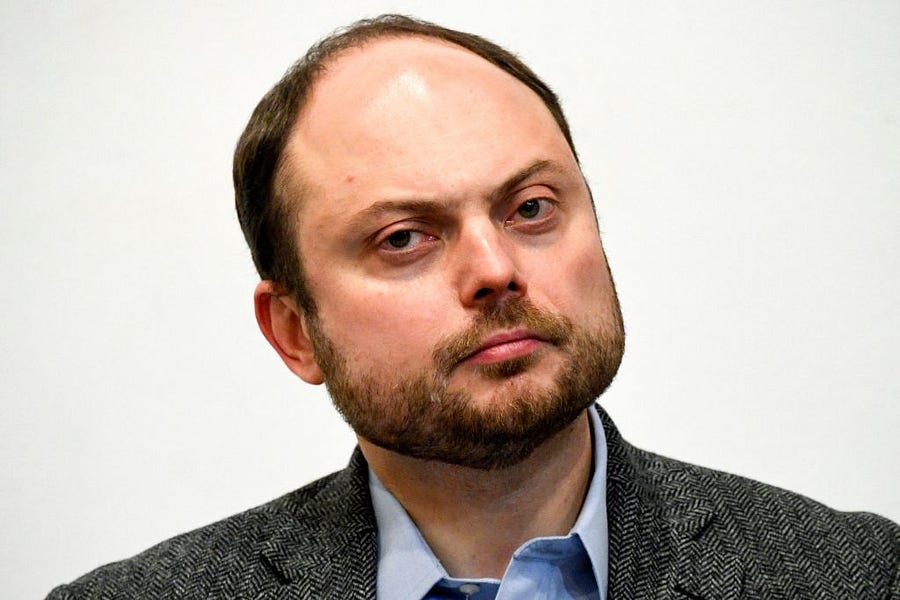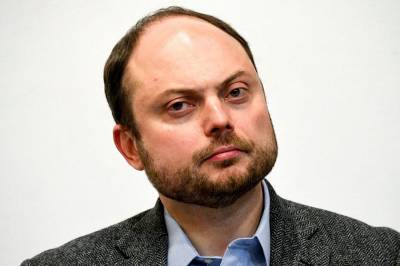Vladimir Kara-Murza, a Russian pro-democracy leader, was sentenced to jail for 15 days Tuesday for “disobeying police.” According to his lawyer, Kara-Murza merely asked the police to identify themselves when they intercepted him at his home after an interview with CNN on Monday April 11. In the interview, Kara-Murza criticized Russian President Vladimir Putin’s “regime of murderers,” but it was likely Kara-Murza’s confident assertion that “the Putin regime will end over this [war in Ukraine] and there will be a democratic Russia after Putin” that led to his arrest.
Kara-Murza is the rare individual who has said this publicly in Russia, but his view is shared by many: Ukraine’s slow but determined democratic progress casts Putin’s bankrupt, authoritarian rule in Russia in the worst light. Moreover, Kyiv’s heroic resistance to Moscow’s shockingly poor execution of the war brings forward the possibility of an end to the Putin era sooner rather than later.
It is impossible to express such views in Russian media outlets. Russia’s state controlled media spews propaganda—including spreading the vile misinformation that presents brutal attacks as the rescue of Ukrainian brothers from their “Nazi” and “drug-addicted” rulers. Although patently ludicrous, the pressure to accept and parrot the regime’s line is reinforced by a spate of new laws that intensify already harsh “foreign agent” laws and add criminal penalties, for example, about spreading “fake news” about the army. It is even forbidden to describe what is happening in Ukraine as a “war,” or Russia’s aggression as an “invasion.”
As a result, the remaining independent media outlets—including newspaper Novaya Gazeta, radio station Echo Moskvy, where Kara-Murza hosted a program, and TV station Dozhd—have been forced to close or suspend operations. Even so, leading journalists are not safe. Novaya Gazeta’s editor, Dmitry Muratov, the 2021 Nobel Peace Prize laureate, was recently assaulted on a train. Such relatively minor attacks have in the past been precursors to assassination.
To change this climate of violence, ignorance and fear, Kara-Murza has urged Western democracies to redouble efforts to provide independent information on the war in Ukraine to Russia’s population. “Many people in Russia do not even know that there is a real war going on in Ukraine,” Kara-Murza told CNN’s Jim Acosta on March 19. “They do not even know about the targeting of civilians, the cluster bombings of residential areas, the bombings of maternity wards, for God's sake.“
In testimony to the Helsinki Commission on March 29, Kara-Murza cited the invaluable work of Radio Free Europe and other outlets behind the Iron Curtain in the 1970s and ‘80s. “Nothing beats totalitarian propaganda better than the truth. And when the Soviet system collapsed, it was primarily because it had been discredited and delegitimized in the eyes of its own people who saw its true nature.”
Adamant that Russia can have a democratic future, Kara-Murza writes often about its history. Citing the bravery of dissidents and democrats from the early 20th century through its Soviet period to the ongoing war against Ukraine, he refutes the notion of a monolithic Russia irrevocably committed to Putin’s revanchist, Eurasian nationalist vision and embarrasses Putin’s U.S. apologists.
Kara-Murza can’t be accused of naivete. He nearly died from poisonings in Moscow in 2015 and 2017. Although responsibility hasn’t been established, the open-source investigative outfit Bellingcat has shown that Kara-Murza was closely shadowed by FSB operatives both times. Bellingcat documented similar surveillance of the imprisoned anti-corruption activist Alexei Navalny leading up to his poisoning on an airplane in Russia in 2020. After recovering, Navalny relied on this information to place a priceless “crank call,” in which he impersonated a senior FSB official to receive a debrief from one of the operation team’s members. Navalny, who like Kara-Murza returned to Russia after recovering from his poisoning, is now serving jail sentences on spurious charges.
Like Navalny, Kara-Murza also refuses to stay outside of Russia, saying there is nowhere else for a Russian politician to be. He insists that it is the duty of Russians, and Russians alone, to achieve democracy in their country. “To state the absolutely obvious,” he said last month on CNN, “only Russians in Russia can change the situation in our country. Nobody is advocating any kind of regime change from outside.”
What Kara-Murza does ask is that the world’s democracies not enable the corrupt Putin regime and its circle and in the process betray their own values. “All this time, Western leaders continued to shake Mr. Putin's hand and invite him to high level summits and try to find ways of dealing with him. ... I cannot … express the feelings of frustration and frankly rage that a lot of us in Russia feel these days because we have been trying to tell the world for 22 years now just who Vladimir Putin was.”
Kara-Murza himself insists he is not alone in seeking a democratic Russian future. He speaks for many who remain anonymous. In response to his request that the U.S. and its democratic allies live up to their principles, they should apply more pressure on the Putin regime to release Kara-Murza and others who are risking everything to bring democracy to their country.
Ellen Bork is a contributing editor at American Purpose. David J. Kramer is managing director for global policy at the George W. Bush Institute and served as assistant secretary of state for democracy, human rights and labor in the George W. Bush administration.






Please note that we at The Dispatch hold ourselves, our work, and our commenters to a higher standard than other places on the internet. We welcome comments that foster genuine debate or discussion—including comments critical of us or our work—but responses that include ad hominem attacks on fellow Dispatch members or are intended to stoke fear and anger may be moderated.
With your membership, you only have the ability to comment on The Morning Dispatch articles. Consider upgrading to join the conversation everywhere.